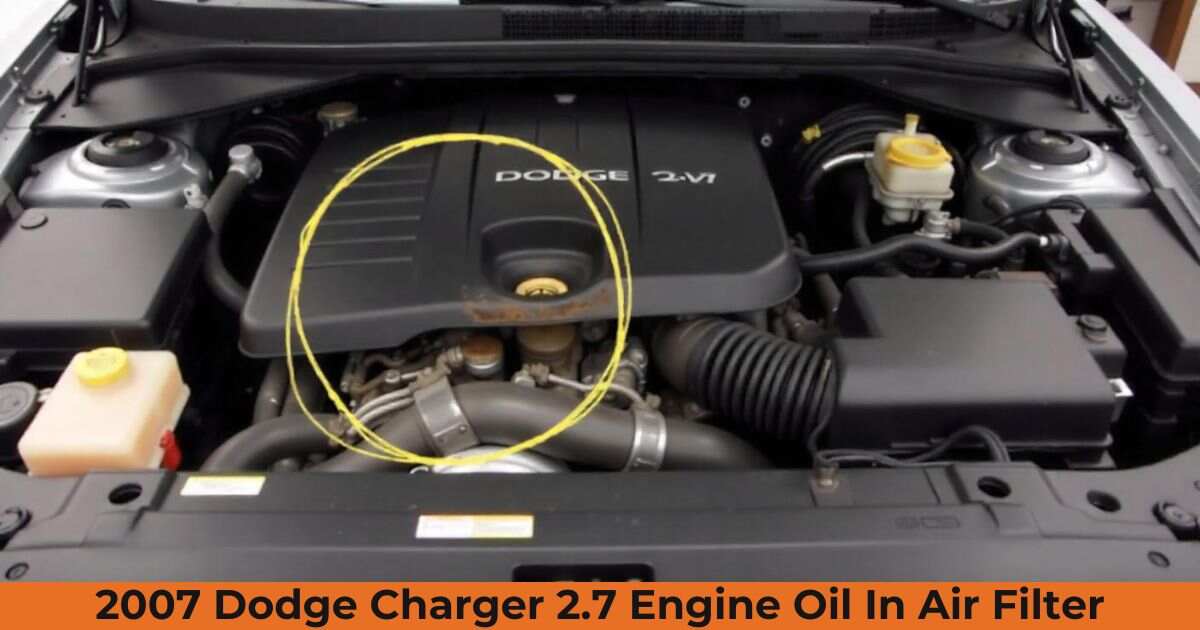The 2007 Dodge Charger 2.7 engine oil in air filter refers to an issue where engine oil leaks into the air intake system, contaminating the air filter. This can happen due to a variety of reasons, such as a malfunctioning PCV valve or engine blow-by.
When oil reaches the air filter, it can reduce engine performance and damage the air intake components. Engine oil in the air filter of a 2007 Dodge Charger 2.7 can be a sign of an underlying issue in the engine.
Typically, this happens when the Positive Crankcase Ventilation (PCV) system isn’t functioning properly, allowing oil vapors to enter the intake system. The oil can then accumulate in the air filter, causing it to become clogged.
This can lead to reduced engine efficiency, poor fuel economy, and potential damage to other components like the mass air flow sensor.
Common Causes of Engine Oil in the Air Filter
Engine oil in the air filter of your 2007 Dodge Charger 2.7 can cause significant issues. It’s important to know the common causes behind this problem.
Malfunctioning PCV Valve
The PCV valve controls the flow of gases from the crankcase back into the intake system. If it gets clogged or breaks, it can cause pressure to build up in the engine.
This extra pressure forces oil into the air intake, where it contaminates the air filter. Regularly checking and replacing a faulty PCV valve can prevent this issue.
Engine Blow-by
Blow-by occurs when combustion gases leak past the piston rings. These gases can increase pressure in the crankcase, pushing oil into the intake system.
This oil then ends up in the air filter. It’s a common issue in older engines or those with worn-out components.
Excessive Engine Oil Level
Overfilling the engine with oil can cause problems. Too much oil creates extra pressure inside the engine.
This pressure can force oil into the intake system, where it ends up in the air filter. Always make sure to check the oil level and avoid overfilling.
Worn Piston Rings
Piston rings help seal the combustion chamber. When they become worn out, oil can leak into the chamber. This oil can then be drawn into the intake system, leading to contamination of the air filter. If this happens, the piston rings may need to be replaced.
Faulty Valve Seals
Valve seals prevent oil from leaking into the combustion chamber. When they’re damaged or worn, oil can seep past them and enter the intake system. Over time, this can cause oil to collect in the air filter. Replacing the valve seals can solve this problem.
Dirty or Clogged Air Filter
If the air filter is too dirty or clogged, it restricts airflow. This restriction can cause pressure to build up in the engine. The increased pressure can push oil into the intake system, where it contaminates the filter. Cleaning or replacing a clogged air filter can help prevent this from happening.
Symptoms of Engine Oil in Air Filter
When engine oil contaminates the air filter of your 2007 Dodge Charger 2.7, several symptoms become noticeable. These signs can affect the vehicle’s performance and should be addressed promptly.
1. Reduced Engine Performance
When oil contaminates the air filter, it can obstruct airflow to the engine. This reduces the amount of air reaching the combustion chamber, leading to poor engine performance, such as sluggish acceleration and reduced power.
2. Poor Fuel Efficiency
With less air reaching the engine, it struggles to burn fuel efficiently. This often results in lower miles per gallon (MPG) and higher fuel consumption.
3. Engine Misfires
Oil in the air filter can cause the engine to misfire or run rough. This happens because the improper air-to-fuel mixture disrupts the combustion process, leading to uneven engine operation.
4. Clogged Air Filter
If the air filter is soaked with oil, it becomes clogged. A clogged air filter can restrict airflow, making the engine work harder to operate, which could cause overheating or even damage over time.
5. Check Engine Light
In some cases, engine oil in the air filter can trigger the check engine light. The vehicle’s sensors may detect abnormal conditions, such as poor airflow or issues with the air intake system, and signal a warning.
6. Blue Smoke from the Exhaust
When oil enters the combustion chamber, it may burn along with the fuel, producing blue smoke from the exhaust. This can be a clear sign of oil leaks within the engine.
How to Fix Engine Oil in the Air Filter Issue
Fixing engine oil in the air filter issue requires addressing the root cause. Here’s how to handle it. Taking these steps will help resolve the issue and keep your engine running smoothly.
1. Replace the Air Filter
The first step is to replace the oil-soaked air filter. A contaminated filter can no longer do its job properly, restricting airflow to the engine. Installing a clean, dry filter ensures proper air intake and engine performance.
2. Inspect and Replace the PCV Valve
If the PCV valve is faulty, it can cause oil to enter the intake system. Inspect the valve and replace it if needed. A working PCV valve will regulate pressure in the engine and prevent oil from entering the air intake.
3. Check for Engine Blow-by
Blow-by can cause oil to leak into the air intake. If you suspect this is the issue, you may need to have the engine’s piston rings or valve seals inspected and replaced. This will prevent oil from entering the intake system.
4. Ensure Proper Oil Levels
Overfilled oil can lead to pressure build-up, pushing oil into the intake system. Check the engine oil level regularly and ensure it’s within the recommended range. If the oil is overfilled, drain the excess oil to prevent further issues.
5. Replace Worn Piston Rings or Valve Seals
Worn piston rings or valve seals may allow oil to seep into the combustion chamber, which can then end up in the intake system. If this is the case, replacing the worn components will prevent oil from reaching the air filter.
6. Clean or Replace the Air Intake System
Sometimes, oil residue can accumulate in the air intake system. Thoroughly clean the intake components, including the throttle body and intake manifold, to remove any oil. If there’s significant damage, replacing these parts may be necessary.
7. Regular Maintenance
To prevent future issues, maintain regular engine check-ups, and follow the manufacturer’s guidelines for oil changes, air filter replacements, and PCV valve inspections. Regular maintenance can help catch problems early and keep the engine running smoothly.
Conclusion
Engine oil in the air filter is a serious issue that can affect the performance and longevity of your 2007 Dodge Charger 2.7. By understanding the causes, recognizing the symptoms, and taking the right steps to fix and prevent the problem, you can ensure your Charger runs smoothly for years to come.
Regular maintenance, quick intervention, and proper oil management are key to keeping your car in top condition.
Frequently Asked Questions
Why does engine oil come in the air filter?
Engine oil gets into the air filter due to issues like a faulty PCV valve, engine blow-by, or overfilled oil. This causes oil to leak into the intake system.
What happens if oil gets into the air filter?
Oil in the air filter can reduce engine performance, clog the filter, lower fuel efficiency, and cause engine misfires.
Why do you put oil in your air filter?
Typically, you don’t put oil in the air filter. However, some filters, like oil-based ones, are designed to trap dirt using a small amount of oil.
How much oil does a 2007 Dodge Charger 2.7 take?
The 2007 Dodge Charger 2.7 requires about 5.7 quarts of oil with a filter change.
What is the most likely cause of oil contamination in the air filter?
The most likely cause is a malfunctioning PCV valve, which allows engine oil to be pushed into the air intake system.
How do you remove oil from an air filter?
To remove oil, replace the contaminated air filter with a new one. If the filter is reusable, clean it with soapy water or a special filter cleaner, then let it dry completely before reinstalling it.









